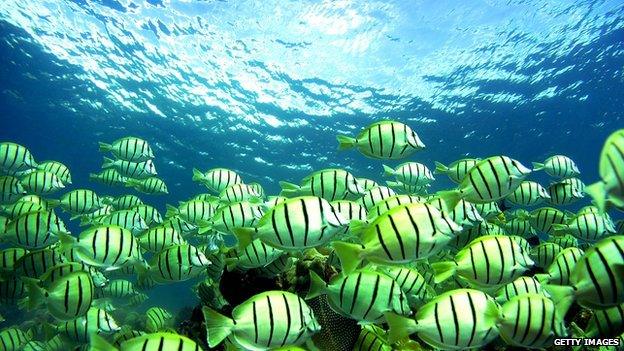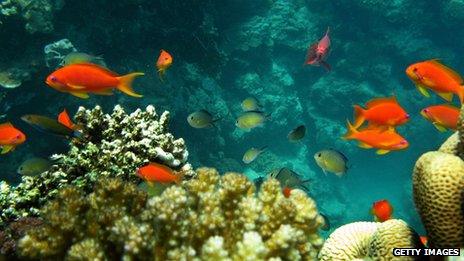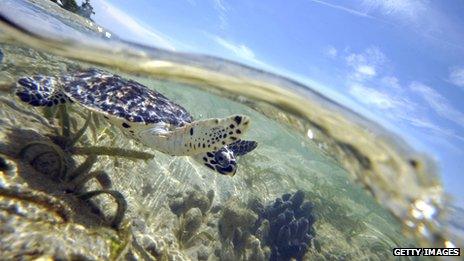Viewpoints: Are humans capable of protecting the oceans?
- Published
- comments

The health of the world's oceans is deteriorating even faster than had previously been thought, a report says.
A review from the International Programme on the State of the Ocean (IPSO) warns that the oceans are facing multiple threats.
They are being heated by climate change, turned slowly less alkaline by absorbing CO2, and suffering from overfishing and pollution.
The report warns that dead zones formed by fertiliser run-off are a problem.
It says conditions are ripe for the sort of mass extinction event that has afflicted the oceans in the past.
Are humans capable of protecting the oceans and preventing a mass ocean extinction? Experts give their views below.
Mitali Kakar, director of Reef Watch Marine Conservation, based in India
In Mumbai where I come from, it is disheartening to see the oceans exposed to pollutants and sewage every single day. The condition in certain areas is abysmal and most of the time the oceans are just treated as dumping grounds.
However without creating too grim a picture, I believe there is hope and we need to have a strategic plan in place - not only to create awareness but also have an action plan in which all citizens should be involved and feel responsible. The oceans are where life first began and preserving and protecting it is intrinsically linked to our survival.
Creating awareness through the education system, through community participation is important for long-term realisation of such a plan. If all stakeholders came together on one platform and discussed the issues and a way forward, we are definitely capable of protecting our rich ocean heritage. It is only through dialogue, discussion and action that we can bring about change at grassroots level and policy level.
Prof Callum Roberts, of the Environment Department at the University of York
It has taken many of us by surprise to find that the oceans are not limitless and that human influence reaches from the remotest regions of the high seas to the deepest abyss.
That is the result of the astonishing acceleration of human population growth, technological advance and globalisation. The oceans are a global concern and these trends demand global co-operation in management.
But international laws and conventions on the sea are still regarded as optional by many countries, who continue to pursue self-interest at the expense of the majority. Sadly, the way forward is unclear. The United Nations is the arbiter of ocean management but is proving itself incapable of delivering sufficient protection.
I have just attended the Global Economic Symposium in Germany at which the need for collective, co-operative action was widely acknowledged but there was little in the way of concrete proposals as to how progress could be made sufficiently fast.
What we need is obvious though: strong laws and regulation to protect the integrity and productivity of marine life that are binding on all nations (not just those who opt in). The world has grown too crowded to sustain the selfish pursuit of narrow national or business interests without regard for the impacts on others.

Judy Maan, CEO of the South African Association for Marine Biological Research (SAAMBR)
Spreading doom and gloom hasn't taken us away from where we're headed. If we go with it we might as well join the polluters. We have to try and keep hope alive and the hope is that "I can make a difference in my local environment".
"I might not be able to save all the oceans but I can save the marine protected area in my vicinity." These small steps add up.
If we take the African context, there is not a lot of money for conservation. It's not a priority. And yet in Africa the environment is much closer to most people than elsewhere.
People have a better intrinsic understanding of the value of the environment because it supplies so many people with resources directly.
Government capacity is not great and when you're driven by need, as opposed to greed, there are different value systems motivating you.
You can't apply the same style of management when you're looking at massive trawlers compared to someone using a mosquito net on the beach.
I see hope but as long as greed is overriding need, such as with foreign vessels in our waters, then we have an even bigger challenge.
Dr Peter Richardson, biodiversity programme manager at the Marine Conservation Society
We are capable of protecting the oceans but it all depends on will, particularly the will of governments and states.
There are international conventions that countries signed up to - some have 'teeth', most don't. But it's up to those signatory states to take governance of our oceans seriously.
Governments tend to put national commercial interests ahead of any international conservation needs. If the national objective is to generate profit and economic growth then often the biology of resources doesn't accommodate that, so fish stocks can become overfished and marine ecosystems collapse.
We need to act immediately to improve the resilience of our marine ecosystems - in some cases that has happened. The UK established the marine protected area around the remote Chagos Archipelago. It was controversial but the fact is that the Archipelago was protected from fishing relatively quickly. In UK waters, where there is more use, our government has been much slower to act.
Nations should manage their territorial waters properly, but also work internationally to manage the high seas, where policing is much more difficult and it's more of a free-for-all for nations to exploit resources.
I'm not so sure about a mass extinction - ecosystems adapt and change, as they have over millenia, but as resource users we will be forced to adapt to fundamental changes in our oceans.

Trevor Manuel, co-chair of the Global Ocean Commission
The simple fact is that we have to protect life in the global ocean. The world will soon be home to nine billion people, and they will need more food, more minerals from the seabed, more medicines derived from ocean organisms, more regulation of the climate. That means having a healthy ocean.
There are measures we could take right now to set us on the road. Our Commission is calling for high seas fishing vessels to carry mandatory identification and tracking equipment; apart from benefiting national security and safety at sea, this would be a powerful deterrent against illegal fishing.
It could be implemented in an instant. We can strengthen pollution controls and ban wastefully destructive fishing practices - also quick, simple changes. Other things may take longer, for example overhauling the governance mechanisms of the high seas, the international two-thirds of the ocean, so there is a legal mechanism for conserving biodiversity. Tackling climate change and ocean acidification are also tough.
Early next year our Commission will publish recommendations to governments that will, if implemented, reverse the tide of decline and restore the ocean to health and productivity. As citizens, it is then our job to persuade them to act: the ocean ecosystem is too big, too important, to fail.
Mikhail Flint, head of the plankton ecology at the P. P. Shirshov Institute of Oceanology, Russian Academy of Sciences
I would not say that there is a threat of mass extinction. Sometimes these problems are more a result of people trying to squeeze money through [exaggerated] threats to the public and politicians.
But overfishing is absolutely a real problem, not only for the populations that have been overfished but for the whole oceanic ecosystem.
International efforts are trying to make our hammering [of these populations] not so hard. And in terms of ecological management we are improving the situation for most of the [overfished] populations.
We will face this problem [of overfishing] in a much more pronounced format when we are talking about the oil and gas resources under the ocean. It will need very tough ecological management and if there is no agreement it will be a real disaster.
Churchill once determined what compromise is - the situation which one is not satisfied with. We need to follow this guideline because [reaching an international compromise] is the only way out.
In this direction we should be a step ahead of what's going on, and we are two steps behind.
Lance Morgan, president of the Marine Conservation Institute
To have any reasonable chance to avert mass extinction in the oceans we must establish a worldwide network of protected areas. Current efforts hold some reason for hope, but they are moving at an insufficient pace and scale to address the severity of the problem.
A system of large areas - a global ocean refuge system - where we stop killing marine life and destroying their habitats can provide resilience for marine life by helping to maintain healthy populations that will be able to replenish areas that become degraded.
The state of California recently enacted a network of marine protected areas along its 1,300 km coastline, but this only covers waters out to three miles. Regional and international efforts along the West Coast of North America have made less progress towards a network (for example the Baja California to Bering Sea initiative, has not yet matured), although a number of marine protected areas (mostly weakly protected) have been established.
This is just a tiny start. Humans worldwide need to act now to save us and future generations.
- Published3 October 2013
- Published21 August 2013
- Published26 September 2013
- Published19 July 2013